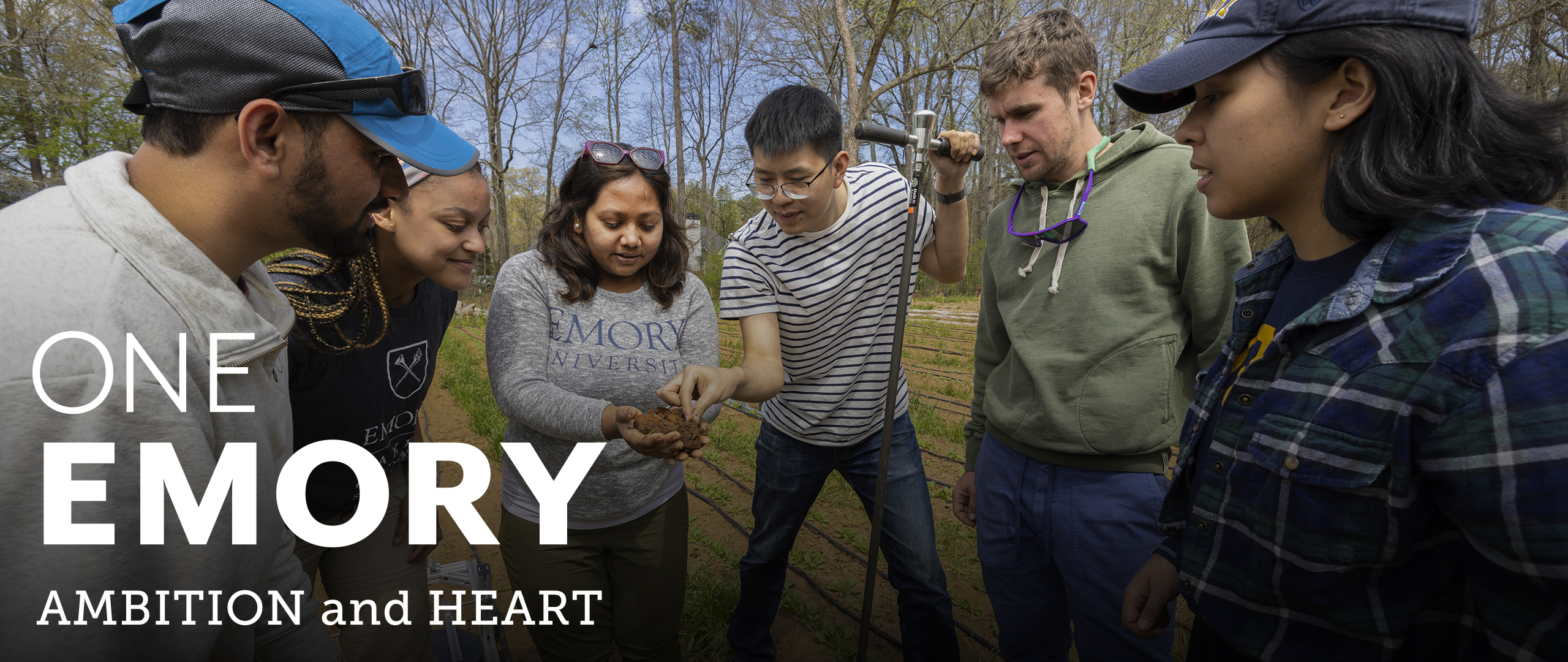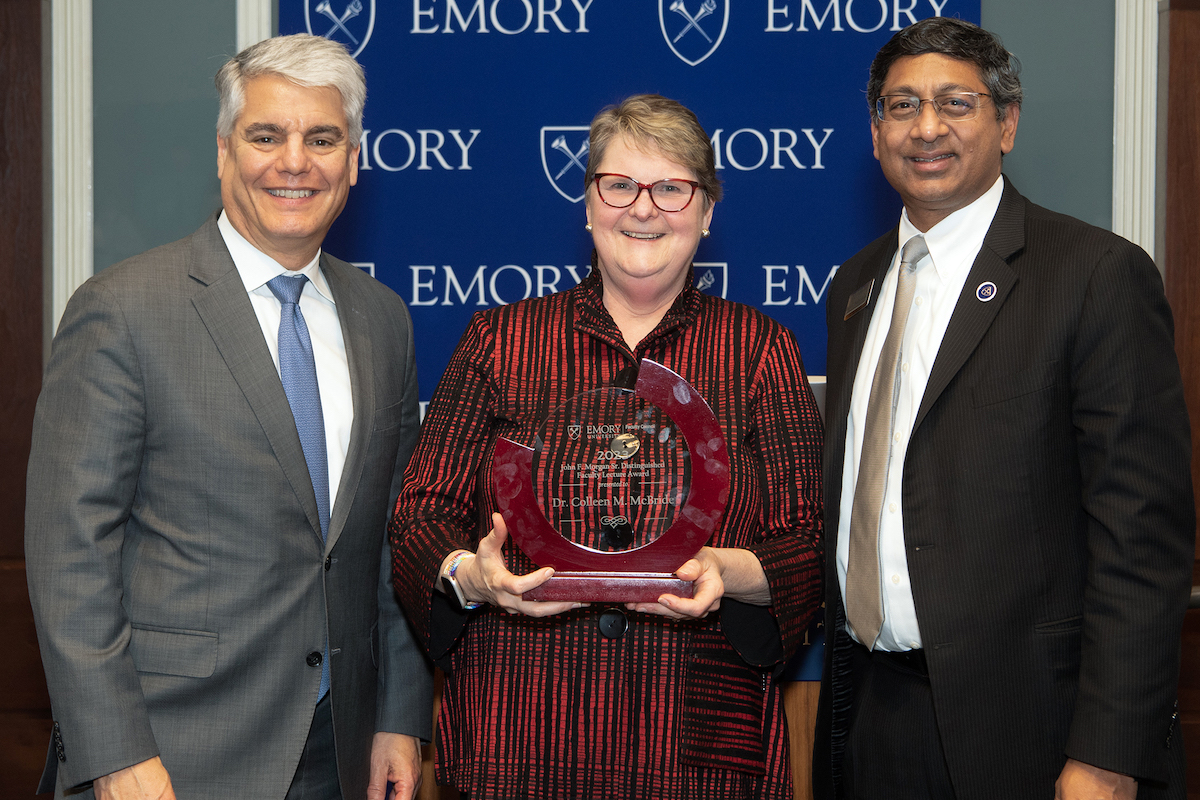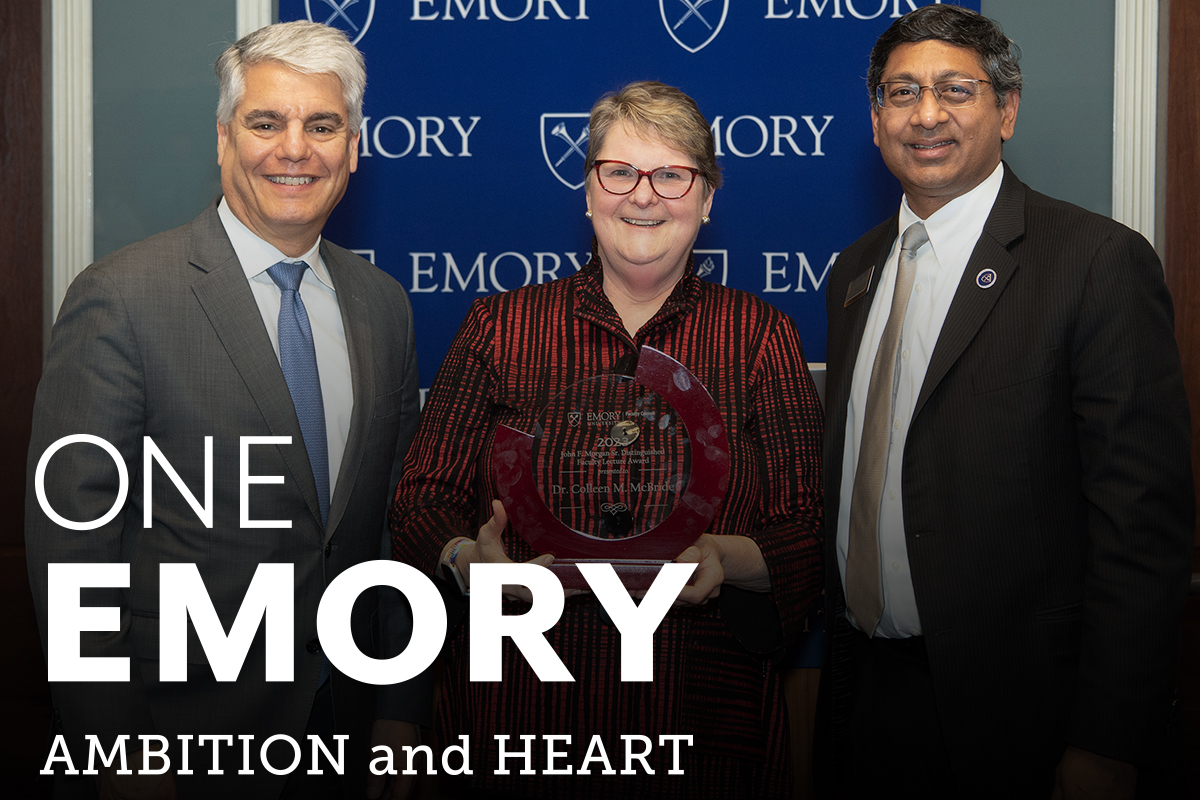
Faculty eminence: ‘The foundation of Emory’
Feb. 15, 2023Each week, Emory Report is featuring one of the six focus areas of One Emory: Ambition and Heart, the reimagined strategic framework announced by President Fenves during the Feb. 7 Charter Week gathering.
“Faculty eminence is the foundation of Emory.”
As Emory President Gregory L. Fenves introduced the reimagined One Emory strategic framework, he focused first on Faculty Eminence.
“Through their research, our faculty answer the great questions, seek knowledge and serve society through their insights, discoveries, scholarship and artistic creations,” Fenves said. “And they are the teachers who educate our students, shaping new generations of leaders.”
The One Emory framework will continue to elevate the university as a destination for world-class faculty with some of the strongest schools and departments in the nation, and Fenves noted a few ways this will be achieved:
- Recruiting more top faculty “while supporting our current faculty because they understand that Emory is the best place for them to excel and express themselves as scholars and teachers.”
- Strengthening Emory’s commitment to diversity when it comes to recruitment and retention “so that talented faculty of all backgrounds contribute their scholarship and perspectives.” Fenves noted that he and Provost Ravi Bellamkonda are working closely with Carol Henderson, vice provost for diversity and inclusion, on this effort “using the DEI Strategic Planning Report to make long-overdue progress in supporting faculty diversity and many other areas that affect all aspects of a renewed One Emory.”
- Positioning Emory faculty to receive honors and accolades, from national academy memberships to prestigious awards and recognitions.
“Faculty eminence enhances every school,” the president concluded, “enabling us to reach new heights.”
Faculty eminence in action:
Three questions with public health professor Colleen McBride

Public health professor Colleen McBride (center) poses with Emory President Gregory L. Fenves (left) and Provost Ravi V. Bellamkonda at the Distinguished Faculty Lecture.
Jack Kearse, Woodruff Health Sciences Center
Colleen McBride serves as professor of behavioral, social and health education sciences in Rollins School of Public Health. On Feb. 7, she presented the 2023 Distinguished Faculty Lecture: “Human Genome Mapped: Public Health Benefit?”
Looking back over a decorated career, Colleen McBride admits, “I have been kind of a rogue public health scientist. It has been really fun.”
In remarks before McBride’s lecture to the Emory community, Fenves noted, “I was struck by the extraordinary power and reach of her research, creating new pathways and possibilities for the application of genomic discovery to improve public health, with special attention to serving the needs of marginalized communities.”
So, what is the rogue element in a career this celebrated? “I follow the idea rather than the discipline. Over the course of my career, if I found something interesting, I would learn whatever I needed to learn,” McBride says.
Focused for years on motivating behavior change, McBride describes entering genetics as “accidental,” another instance of following ideas that intrigued her.
Once, while being interviewed by the world-renowned physician-geneticist Francis Collins for a position at the National Human Genome Research Institute, McBride did what most interviewees strenuously avoid; she pressed hard on her weak spots, telling Collins that she didn’t at that time have much genomics experience.
He was undeterred, saying, “We have a lot of people who know a whole lot about genomics; that is not what we need from you.” And so began what she described as an “immersion experience” not so different from “learning a new language.” And the thing that fueled her success? “I am not shy about saying, ‘I don’t understand.’”
Asking questions has gotten her far indeed, including being honored with the 2015 Distinguished Scientist Award from the Society of Behavioral Medicine.
As she began this year’s Distinguished Faculty Lecture, she warned listeners that the question mark in her title was there for a reason. She didn’t know all the answers.
Her talk described a project in partnership with the Georgia Comprehensive Cancer Registry to identify survivors of ovarian cancer outside of clinical settings with the goal of reaching their relatives, who need to be more aware of their cancer risk. Clinical interventions don’t have the reach, or as McBride notes, “They get clobbered in the real world.”
Needing an intervention that would be “low in cost” and “light in touch,” she and her colleagues tapped into the Genetic Counseling Training Program at Emory. Given that these are counselors in training (overall, in the U.S., there are fewer than 5,000 genetic counselors), the service could be provided for free. They also engaged citizen-scientists who have entree into patient-support groups. In the end, these efforts had mixed results, with online outreach having less impact than expected; however, the project demonstrated the feasibility of working with existing services to broaden genomic service reach.
“Taking something out into a broader population, where there are so many potential avenues, requires a ton of imagination. That is inherently an interdisciplinary activity,” she says. And, for McBride, that is where all the fun comes in.
Q: What inspired you to devote so much of your career to motivating behavior change?
I am the only child of parents who smoked two packs of cigarettes a day and struggled with their addiction to nicotine. When my dad was diagnosed with emphysema, which impaired him for the last 25 years of his life, the doctor didn’t tell him to quit smoking. I had to call the doctor and tell her, “This is a teachable moment.”
Smoking cessation thus was a huge part of my early career. I watched as the surgeon general’s report led to higher-income people quitting smoking. In the 1990s and onward, smoking has been a poor person’s behavior. As a first-generation college student who came up through an unlikely pathway, inequities always have been very relevant to me.
Q: In your Distinguished Faculty Lecture, you note that most genetic databases are for those of European ancestry; databases are very limited for those of African or Hispanic/Latin ancestry. In your words, the evidence base scientists are working from is “not fair or inherently just.” When will this change?
It is stunning that this is the case, and there are so many negative implications. Every single person in Iceland is sequenced, for example. The same is true in parts of Europe. That is where these databases have been derived from. They have taken science pretty far, but again, they didn’t begin with the end in mind. However, there are efforts being made — for instance, the All of Us Research Program.
Q: In the president’s One Emory speech, he observed: “To see our stellar faculty in action, look no further than this year’s Distinguished Faculty Lecture, which will be given by Colleen McBride.” What did that honor feel like?
It has been gratifying to get this award. It comes at a time in my career when I am reflecting. I have had so much fun and given so much of my life energy to my work. I remain glad that I have not followed a straight-and-narrow path, that instead I ran after ideas. I take so much from my collaborations with junior faculty and graduate students. I hope there is a legacy in the kind of research that I have been doing, that I have put a good wind in our sails.
Editor's note: Interview by Susan Carini. Lead photo by Kay Hinton showing environmental biogeochemist Debjani Sihi (center), assistant professor of environmental studies, examing soil at the Oxford Organic Farm.






